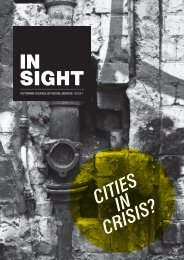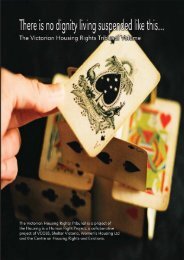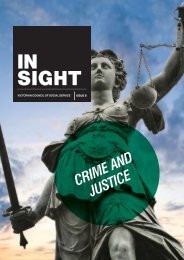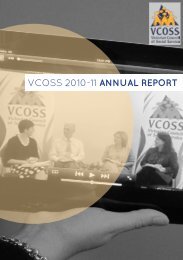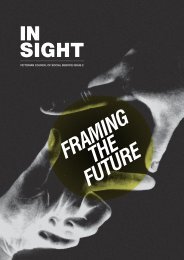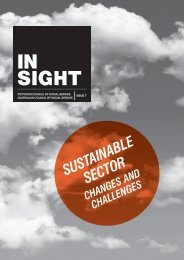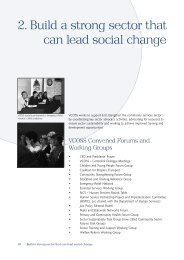Download PDF
Download PDF
Download PDF
Create successful ePaper yourself
Turn your PDF publications into a flip-book with our unique Google optimized e-Paper software.
023. SETTING THE AGENDA<br />
AUTHOR RENÉE KOONIN<br />
INSIGHT 3<br />
BINDING VALUES<br />
What are the values that drive and shape work in the community sector.<br />
Renée Koonin reflects on a career which began in apartheid South Africa.<br />
I was born in Johannesburg, South Africa to parents who were refugees from Nazi Germany. I<br />
grew up under the apartheid regime and was exposed early to the impacts of its inequality and<br />
oppression. I was taken into townships and encouraged to ask questions: why black people were<br />
glaringly disadvantaged, why black men and women were not allowed to live together as husband<br />
and wife, why the security police raided their dingy premises to enforce this law? And why their<br />
children were being reared far away, in so-called Homelands?<br />
I began my professional career during the turmoil of the Soweto riots in 1976. The following year<br />
I moved to Cape Town and worked until 1983 in the townships of Athlone, Langa, Nyanga and<br />
Guguletu, confronting the oppressive realities of detention without trial, the demolition of squatter<br />
camps in which the most impoverished people struggled for existence, the banning of organisations<br />
deemed in opposition to the regime and the almost total absence of services for black people who<br />
suffered every day the inequities of apartheid.<br />
PHOTO: Paul Weinberg, South Africa (www.paulweinberg.co.za)<br />
As a young worker confronted with such profound<br />
injustice, it was an enormous challenge to find a way to<br />
play any meaningful role. Working for the government in<br />
that context was unthinkable and it was to the community<br />
not-for-profit sector that I turned. Many community<br />
organisations, of course, simply toed the official line. But<br />
others were up to the challenge of working for meaningful<br />
change and committed to the creation of services, even in<br />
the most unpromising circumstances. These organisations<br />
were capable of remaining true to their values in the most<br />
adverse environment and despite government policy.<br />
These organisations made a difference.<br />
I have spent almost my entire working life in the nongovernment<br />
not-for-profit community sector, including<br />
27 years in Australia, seeking to challenge and address<br />
social inequality in all its guises, much of it in the<br />
disability sector.<br />
I am therefore speaking from the coalface – a personal<br />
and professional perspective of the consequences of<br />
injustice and structural inequality and work to redress it.<br />
My voice is that of a witness and a participant during the<br />
most challenging political and economic circumstances.<br />
And, I am a practitioner who has consciously chosen to<br />
work in the not-for-profit community sector because of<br />
my understanding of and commitment to its values and<br />
strengths, working alongside 200,000 others with a vision<br />
similar to mine – a society based on equality, fairness and<br />
social justice – and a belief in the role of the community<br />
sector in achieving this goal.<br />
SHARED VALUES<br />
In the maelstrom of South African apartheid,<br />
the promise of working in the community sector<br />
was the opportunity to:<br />
• Hold in my heart a vision of a society at odds<br />
with the one of the prevailing government – a<br />
non-racist, non-sexist, just community.<br />
• Think laterally – to analyse the prevailing<br />
problems and to develop innovative practice<br />
that could in some way achieve this vision.<br />
• Do whatever was possible to transfer power<br />
(skills, knowledge, money and other material<br />
resources) to those most disadvantaged.<br />
• Work in a way that cut across the range of social<br />
issues and did not divide people into silos.<br />
• Advocate for the most disadvantaged and<br />
marginalised members of the community and<br />
challenge injustice.<br />
• Develop social capital through the voluntary<br />
participation of people committed to achieving<br />
the goals of the organisation, developing<br />
informal support networks and contributing to<br />
civil society.<br />
• Work in a democratic organisation.<br />
• Develop links with other national and<br />
international organisations that were willing<br />
to help challenge the status quo.
024. SETTING THE AGENDA<br />
INSIGHT 3<br />
Hence, work in this context was both practical and<br />
political. What did that look like in practice?<br />
• We were able to appoint people on the basis of their<br />
ability rather than race.<br />
• We could use our resources to support those with<br />
the greatest need, rather than according to stratified<br />
entitlements based on race. This meant a direct challenge<br />
to the regime as grants were given on a racial basis. We<br />
provided services in communities where none existed.<br />
• We employed strategies, most notably community<br />
development practice, to enable people to have a voice,<br />
to organise and to take action on their own behalf.<br />
This is hardly radical, but was considered treason in<br />
apartheid South Africa.<br />
• We created links and alliances with other organisations<br />
which supported our ideals - such as trade unions and<br />
internationally with funders who were prepared to<br />
support this work.<br />
So what are the value principles that guide the finest work<br />
in this sector in Australia?<br />
• Vision and mission driven, not market driven:<br />
reinvesting surpluses in the community through<br />
additional services or increased quality; the altruistic<br />
purpose can lead to greater trust and engagement of<br />
marginalized individuals, families and communities.<br />
• Independence: exercising the right of people to<br />
associate and organise themselves and others,<br />
independent of the State.<br />
• Social justice: striving to make a difference and<br />
promote lasting social, environmental, political and<br />
economic change.<br />
• Diversity, dignity and respect: celebrating diversity,<br />
taking account of individual needs and circumstances<br />
and developing integrity in relationships.<br />
• Responsiveness and flexibility: being more responsive<br />
than government organisations to emerging or<br />
unrecognised needs.<br />
• Participation and empowerment: including those we<br />
serve in management structures, policy and program<br />
development and service delivery processes. A<br />
long term commitment to an issue, client group, or<br />
community brings a potent history to searching for<br />
new understandings. The altruistic mission generates<br />
goodwill which mobilises additional human and<br />
material resources for building community cohesion and<br />
social capital.<br />
• Innovation: ability to anticipate new needs and respond<br />
more effectively to entrenched inequality.<br />
In many ways, therefore, the values that motivated me in<br />
the early years of my career are mirrored in those held<br />
in the not-for-profit sector in Australia today. But our<br />
community faces its own set of challenges:<br />
• FUNDER/PROVIDER MODEL<br />
A progressive shift in the relationship with government<br />
towards a funder/provider model mitigates against<br />
creativity, engenders a ‘them and us’ attitude and creates<br />
a lack of understanding about the respective roles. This<br />
challenges our capacity for far-sighted vision and our<br />
influence on social policy. In addition, the silo structure<br />
of various government departments means that the<br />
reporting mechanisms are unnecessarily complex and<br />
regularly require duplication.<br />
• REGULATION<br />
The sector is hampered by a myriad of complex and<br />
cross-cutting regulatory requirements.<br />
• COMPETITIVE TENDERING AND<br />
UNDERFUNDED CONTRACTS<br />
Competitive tendering has meant that often services<br />
undercut each other, while funding rarely covers<br />
infrastructure costs including rent, training, IT and<br />
administration. As a result, some smaller services have<br />
disappeared. In addition, community organisations<br />
have needed to focus on business decisions, such as<br />
profitability as well as their mission.<br />
PHOTOS: Paul Weinberg, South Africa (www.paulweinberg.co.za)
025. SETTING THE AGENDA<br />
INSIGHT 3<br />
• DATA COLLECTION<br />
Definitions used for data collection and reporting on<br />
programs are inconsistent and waste time and other<br />
resources. The information flow is largely one way –<br />
feedback is rarely received from the funding body.<br />
• PERFORMANCE MONITORING<br />
Most performance monitoring processes look at<br />
monitoring service agreements and assess inputs and<br />
outputs, a tick-box approach, rather than outcomes.<br />
• FOR-PROFIT ORGANISATIONS<br />
We face the prospect of increasing competition from<br />
organisations that operate from a profit motive, for<br />
example under the proposed National Disability<br />
Insurance Scheme.<br />
• WORKFORCE<br />
The sector faces significant workforce challenges –<br />
including the relative pay inequities, casualisation,<br />
ageing of the workforce and appropriate training<br />
and qualifications.<br />
• STIFLING OF INNOVATION<br />
All of these factors weigh heavily on the sector and<br />
combine to stifle innovation and our capacity to formulate<br />
new approaches to emerging needs. There is very limited<br />
opportunity for organisations to imagine, create and<br />
experiment and to seek funding for issues not yet on the<br />
mainstream agenda and solutions outside the current<br />
focus of government. Our vision, independence and<br />
capacity for responsiveness are all compromised.<br />
How then do we address pervasive disadvantage in our<br />
society and hold fast to our values as we simultaneously<br />
tackle challenges within our sector and remain effective<br />
and vibrant?<br />
I return to apartheid South Africa, the crucible in<br />
which my thinking about values and a commitment to<br />
social justice was forged. I was afraid to act and I was<br />
compelled to act.<br />
My home overlooked the ocean. From my verandah I could<br />
see Robben Island, where Nelson Mandela was detained.<br />
I did not share Mandela’s measure of courage, but he did<br />
shine a light on what was possible.<br />
During my education at the University of the<br />
Witwatersrand, only white students were accepted. The<br />
very few black students who were able to negotiate their<br />
way through the legal, political, social, emotional and<br />
financial obstacles that inhibited their opportunity for<br />
learning had to study at the University of Ford Hare where<br />
they were forbidden to study community development.<br />
One of the strategies I employed was to educate black<br />
social workers in community development processes. In<br />
turn, they were able to work with the Xhosa speaking<br />
members of their communities and inspire them to work<br />
together. One of my cherished memories is the shining<br />
face of the chairman as he watched the different groups<br />
interacting, planning, negotiating…for an instant the full<br />
weight of the oppression he experienced lifted. He smiled<br />
at me and said: ‘Renée, this is wonderful. We have so<br />
much to do!’<br />
We cannot all emulate Nelson Mandela. We can only do<br />
what is possible within our sphere of influence. That is our<br />
responsibility. To quote Leonard Cohen:<br />
Ring the bells that still can ring<br />
Forget your perfect offering.<br />
There is a crack,<br />
A crack in everything -<br />
that’s how the light gets in.<br />
Renée Koonin is the Sydney-based General Manager of The<br />
Housing Connection. This is an edited and abridged version of<br />
her address from the opening plenary session of the 2011 ACOSS<br />
conference. An unedited version of her speech can be found at:<br />
www.vcoss.org.au.



